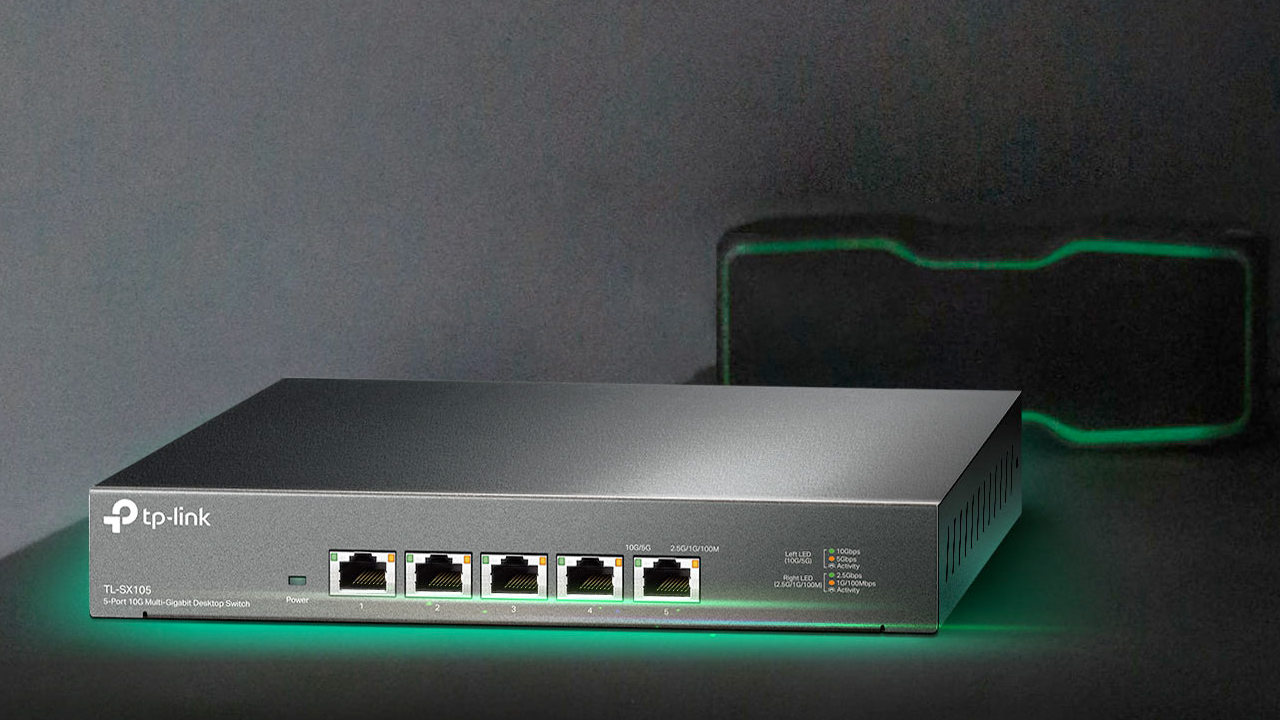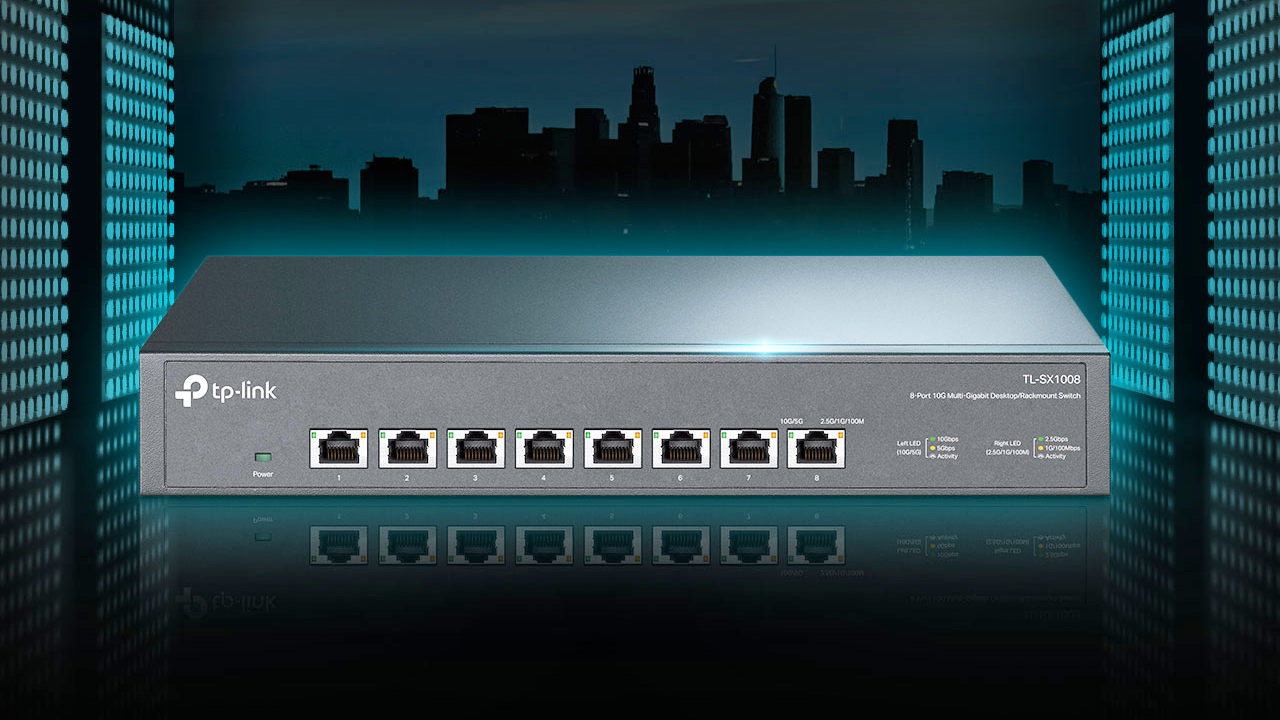TP-Link's Cheap 5-port and 8-port 10GbE Switches Now Available
Reasonably priced 5-port and 8-port 10GbE switches incoming.
Nowadays, many individuals and small businesses need to transfer large amounts of data around homes or offices, so they need something faster than GbE networks. While there are numerous reasonably-priced 10GbE network cards and motherboards with built-in 10GbE controllers, 10GbE networks have not really taken off even with copper cables because 10GbE switches have been prohibitively expensive so far. It looks like things are starting to change as TP-Link just began offering inexpensive 5-port and 8-port 10GbE switches.
TP-Link's 5-port TL-SX105 and 8-port TL-SX1008 10GbE switches are based on unknown hardware, but they feature a 100Gbps and a 160Gbps switching capacity, so they should be good enough to connect several 10GbE devices. The switches are backward compatible with 100Mbps, GbE, 2.5GbE, and 5GbE connections, yet they have to use CAT6 or CAT6a copper cables to hit 10GbE speeds. Both units come in metal chassis. The smaller model is cooled passively, whereas the bigger unit uses a fan that adjusts its speed based on load and temperature.
The 5-port TL-SX105 and the 8-port TL-SX1008 10GbE switches recently showed up in Tokyo, Japan, reports Akiba PC Hotline. The five-port model is priced at ¥29,900 including tax, whereas the SKU with eight 10GbE connectors costs ¥39,900.
In the U.K., both models are available for pre-order for £239.99 and £329.99 at Scan.co.uk, but their ETA date is overdue since March 13, 2021. At this point, we have no idea about MSRPs of TP-Link's TL-SX105 and TL-SX1008 switches in the U.S. or when they will be available on this side of the pond. Meanwhile, if we exclude taxes, the smaller model will likely carry a $275 MSRP, whereas the bigger version will cost around $450.
TP-Link is known for its reasonably priced products, so it is not surprising that the company is among the first to bring inexpensive 5-port and 8-port 10GbE switches to market. Obviously, if one company can build such products, other manufacturers will eventually follow.
Technically, Asus has offered its XG-U2008 switch for years, and at times it could be bought for $230, but this product had only two 10GbE ports, which to a large degree ruined its appeal among users with more than two 10GbE devices.
Get Tom's Hardware's best news and in-depth reviews, straight to your inbox.

Anton Shilov is a contributing writer at Tom’s Hardware. Over the past couple of decades, he has covered everything from CPUs and GPUs to supercomputers and from modern process technologies and latest fab tools to high-tech industry trends.
-
spongiemaster Reply
Not really. I bought a Netgear 5 port 10GbE switch for $350 over a year ago. This isn't that much cheaper. You can currently buy a name brand 8 port 1GbE switch for $20 from Amazon. The 8 port version announced here is $450. The 5 port needs to get under $100 before we start talking about game changing.Johnpombrio said:This could be a game-changer in getting 10GbE ready for use at home.
Edit, Looking at the price history of the Netgear models, the 5 port has been as low as $340 multiple times over the last year, and the 8 port has been as low as $450 multiple times. So this announcement isn't moving the pricing needle all that much lower. -
bernieo a quick look i found it for £299 at ccl .the 8 port.Reply
only trouble is its not managed so vlan ,teaming , and qos maybe a problem .
but prices are getting better
unlike certain gpus -
Makaveli This looks good.Reply
TP link if you are reading this please release a newer version of the
TP-Link MC220L Gigabit Media Converter
This is used to convert Fiber to Ethernet which is useful for those of us with Fiber internet connections so we can bypass the ISP provided modem and just run the fiber directly to the converter then ethernet to our own router.
However this device will only Support 1Gbps and I would like to see it updated to support atleast 2.5Gbps speeds. 5Gbps and 10Gbps would be nice to future proof the device but I understand it may increase cost and cooling requirements. -
w_o_t_q Expensive if look at https://www.balticnetworks.com/mikrotik-12-port-10g-rj45-and-4-port-sfp-cloud-router-switch-l5 it cost 500 usd and is an enterprise level product with affordable price number of ports are much larger plus better security, featured in Linus tech tips about cheap 10g if willing to invest in a cheap 10g go for microfiber 10g it possible to get 4 ports around 200 usd yes cheap tools for the fiber you will need buy, but after all fiber is future and much easies to install into wallsReply -
InvalidError $60 per port is kind of steep when you can get 8x1G for under $30, still a long way away from becoming a mainstream commodity. That said, more choices for people who need/want it now doesn't hurt. I doubt I'll be bothering with more than 1G for another 5+ years.Reply -
JamesJones44 You would have to light my family jewels on fire before I bought anything from TP-Link... But I hope this starts getting other makers to start making more affordable multi gig switches.Reply -
Sparkie951 Way too expensive... Fiber is the real way to go... Check out Mikrotic... Better product, never had any luck with TPLink! I shy away from them.Reply -
velocityg4 It's annoying that prices are still so high and adoption has been so slow. 10 GbE, the twisted pair variant, has been around since 2006. This is really old tech and prices are still high.Reply
8-port Gigabit switches could be bought for $50 in 2006. Back then I'd have thought Fiber Optic 100GbE would be common place by 2021, at the $50 for 8-port price point, if not 1TbE. Given how quickly we jumped from 10 to 100 to 1000 MbE and how fast prices dropped for each standard.

